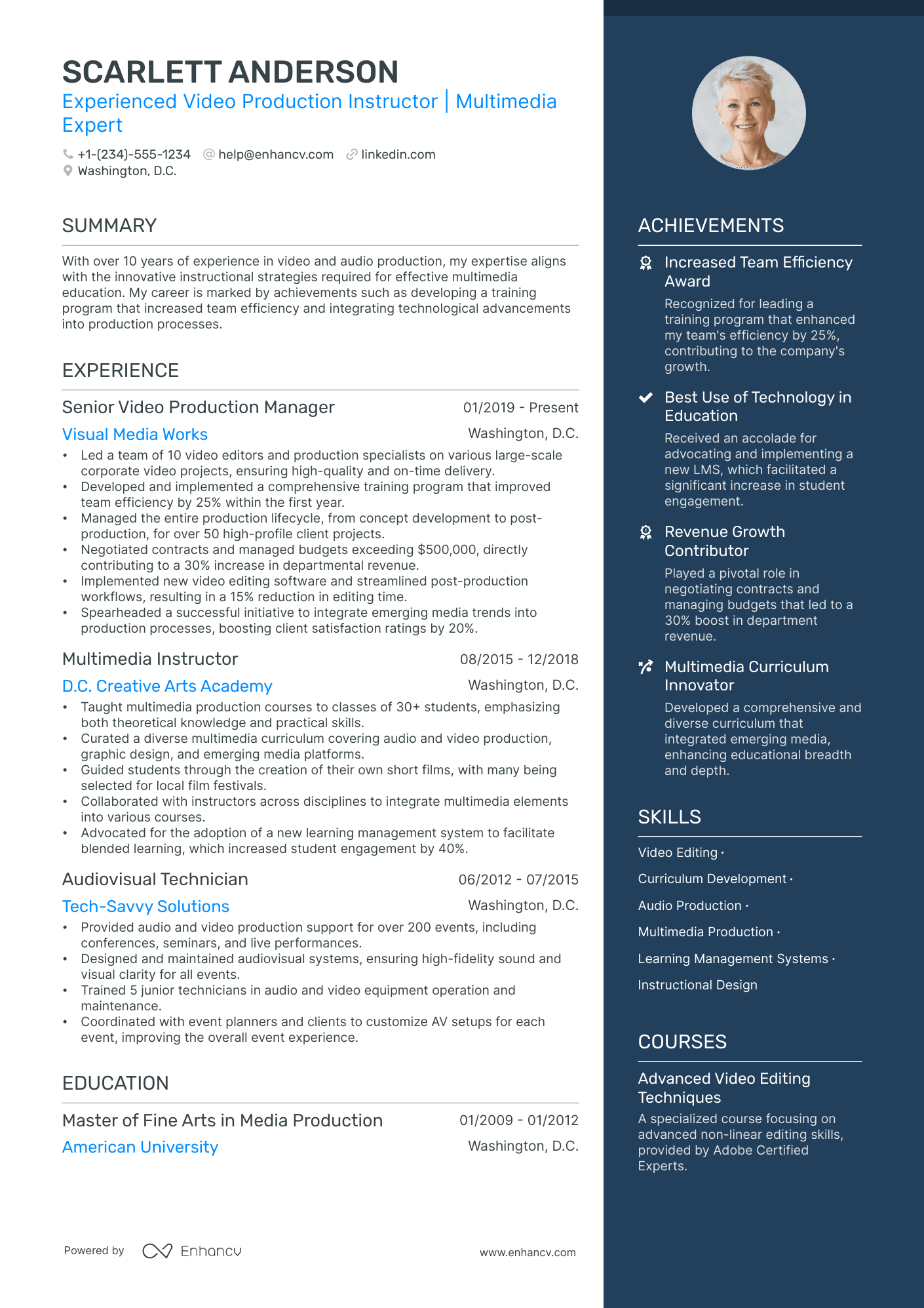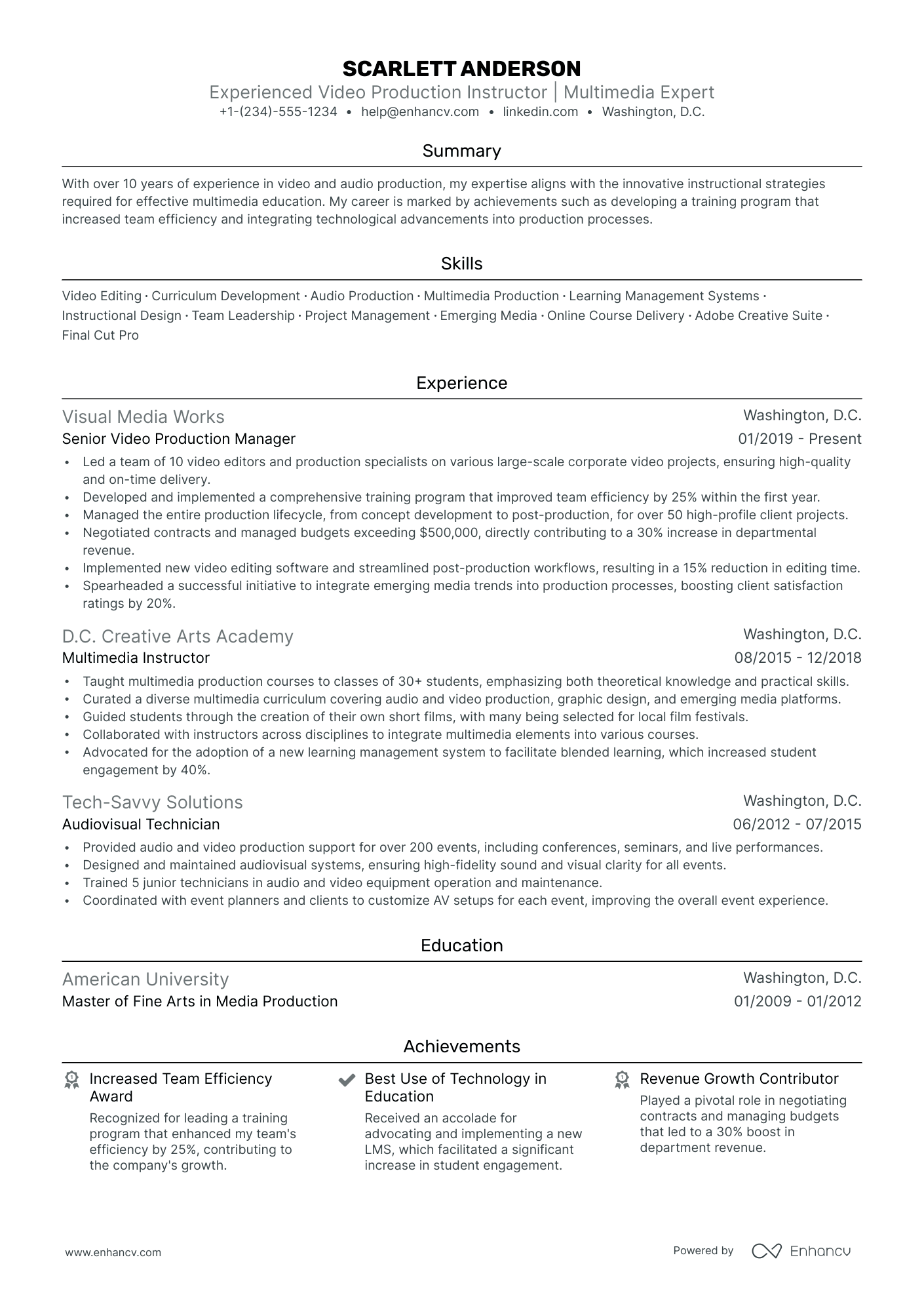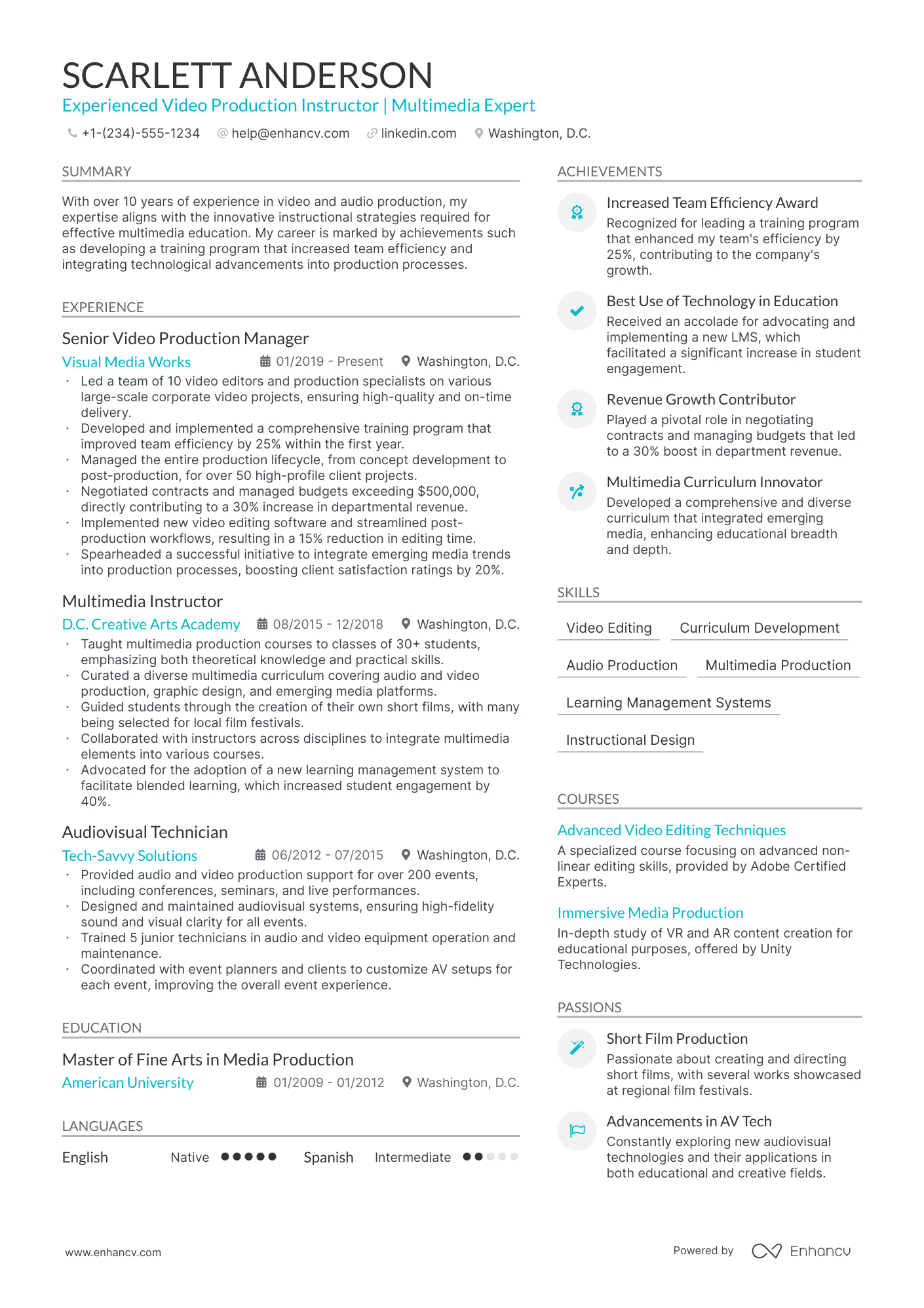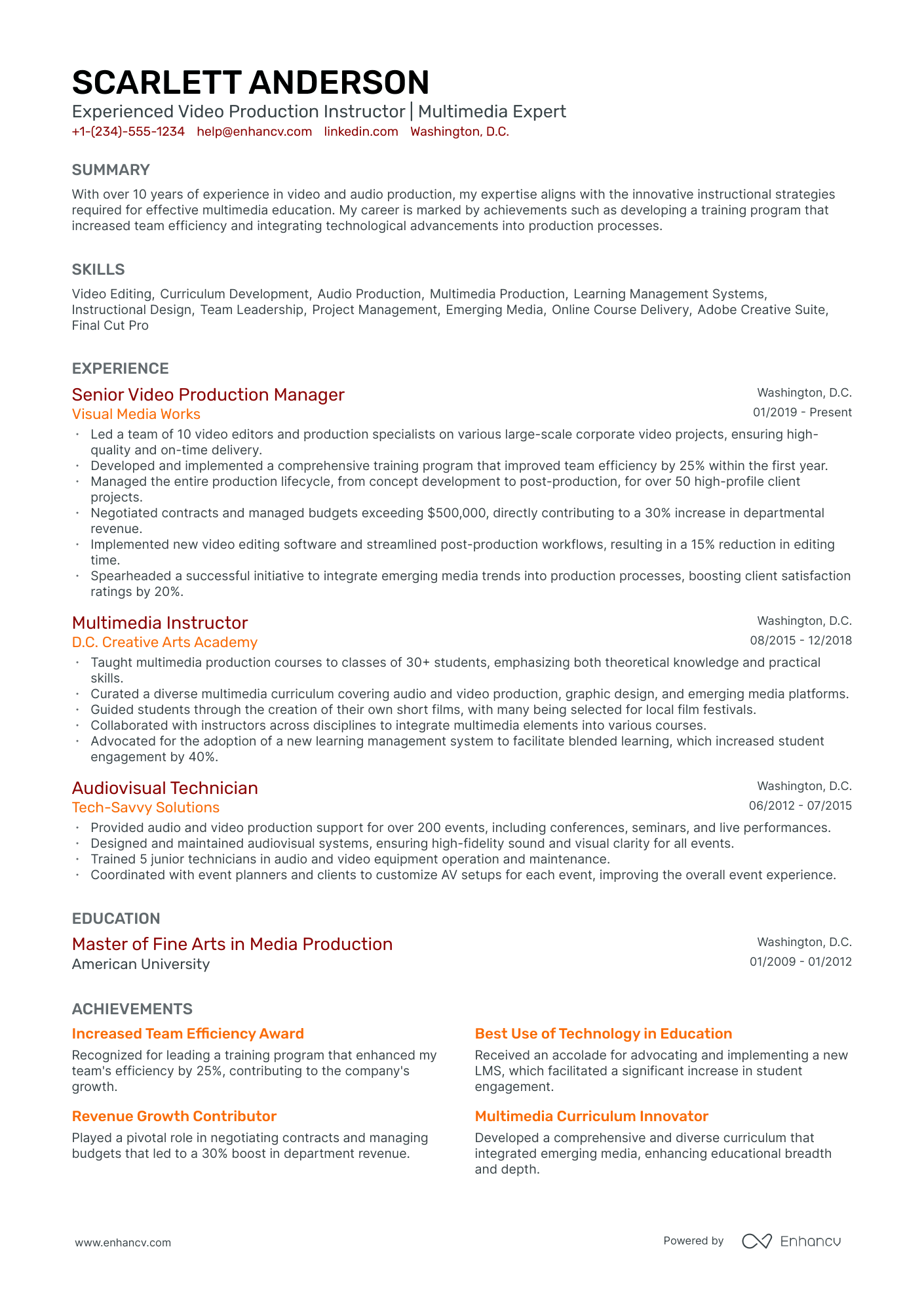One resume challenge in film production is showcasing your diverse project experience without overwhelming potential employers with too much detail. Our guide provides targeted strategies to help you concisely convey your most impactful work, ensuring your resume makes a lasting impression.
- Film production resumes that are tailored to the role are more likely to catch recruiters' attention.
- Most sought-out film production skills that should make your resume.
- Styling the layout of your professional resume: take a page from film production resume examples.
How to write about your film production achievements in various resume sections (e.g. summary, experience, and education).
The importance of format and layout in your film production resume
Consider you're an HR professional at company X, evaluating two film production candidate resumes. John Smith presents a simple, traditional, and easy-to-read resume. Edward Price, however, uses a non-conventional, often illegible format. Whose resume would you spend more time on to understand their experience? This scenario underscores the importance of your film production resume’s design. It should be simply formatted and clearly communicate why you are the ideal candidate for the role.Achieve this balance by:
- Listing your experience, beginning with the most recent and relevant, in reverse chronological order;
- Ensuring your header contains essential information, such as contact details, a headline, and a portfolio link. Include a professional photo in the film production resume header if you have one;
- Including only the most important and relevant resume sections to showcase your expertise and stand out from other candidates;
- Editing your film production resume to be no longer than two pages if you have extensive relevant experience. Use your limited resume space judiciously.
Also, remember that your film production resume might initially be scanned by an Applicant Tracker System (ATS).
When it comes to ATS:
- Opt for simple and legible fonts like Raleway, Rubik, Lato, etc., making your experience easy for the ATS to scan;
- Use serif and sans-serif fonts, both of which are ATS-friendly;
- Avoid overused options like Arial and Times New Roman, which, while suitable, may lack personality.
Contrary to a common myth, our recent study shows that the ATS can effectively process both one-column and two-column resumes. Learn more about this in the ATS myths guide.
Finally, when submitting your film production resume, always export it as a PDF to ensure all information remains intact, making the document easier to print, read, and scan.
Upload & Check Your Resume
Drop your resume here or choose a file. PDF & DOCX only. Max 2MB file size.
PRO TIP
List all your relevant higher education degrees within your resume in reverse chronological order (starting with the latest). There are cases when your PhD in a particular field could help you stand apart from other candidates.
The key to your film production job-winning resume - present your expertise with these sections:
- A header to make your resume more scannable
- Snapshot of who you are as a professional with your resume soft skills, achievements, and summary or objective
- Job advert keywords in the skills section of your resume
- Resume experience quantifying your past job successes with metrics
- A relevant education, certification, and technical sills section to provide background to your technological/software capabilities
What recruiters want to see on your resume:
- Relevant film production Experience (e.g., Assistant Director, Producer, Production Coordinator roles)
- Project List with Notable Productions (including film types such as feature films, short films, commercials, etc.)
- Technical Skill Set (e.g., proficiency in production software like Final Draft, Movie Magic Scheduling, and budgeting software)
- Network and Collaborations (e.g., notable directors, studios, or production companies worked with)
- Problem-Solving Examples (particularly those that showcase abilities in managing on-set challenges, budget restrictions, and tight schedules)
Writing your film production resume experience
Within the body of your film production resume is perhaps one of the most important sections - the resume experience one. Here are five quick tips on how to curate your film production professional experience:
- Include your expertise that aligns to the job requirements;
- Always ensure that you qualify your achievements by including a skill, what you did, and the results your responsibility led to;
- When writing each experience bullet, ensure you're using active language;
- If you can include a personal skill you've grown, thanks to your experience, this would help you stand out;
- Be specific about your professional experience - it's not enough that you can "communicate", but rather what's your communication track record?
Wondering how other professionals in the industry are presenting their job-winning film production resumes? Check out how these film production professionals put some of our best practices into action:
- Coordinated with a team of 50+ to manage the production schedule of a major Hollywood feature film, ensuring milestones are met ahead of deadlines.
- Liaised between the director, producers, and department heads to facilitate smooth communication, resulting in an on-time delivery of the final cut.
- Managed a $10 million production budget, effectively allocating resources to reduce overall expenses by 15% without compromising the artistic vision.
- Oversaw location scouting and acquisition for 20+ film sets, contributing to the successful execution of shooting schedules for numerous indie films.
- Initiated cost-saving strategies in equipment rental negotiations, saving the production company an average of $5,000 per project.
- Implemented a new digital asset management system, increasing the efficiency of post-production editing by 25%.
- Supervised daily operations on set for a multi-award-winning film, ensuring compliance with all safety and union regulations.
- Led a cross-functional team of 100+ cast and crew, fostering a collaborative environment that was commended by executive producers.
- Enhanced script breakdown process using innovative software, which improved scheduling accuracy by 20% and reduced production downtime.
- Collaborated in the development and production of a slate of indie films that garnered attention at international film festivals including Sundance and Cannes.
- Formulated a targeted outreach strategy that secured over $2 million in additional funding from investors.
- Pioneered the use of virtual production techniques, contributing to a 30% decrease in overall production costs.
- Assisted in the creation of visually compelling set designs for 3 critically acclaimed historical dramas, praised for their authenticity and attention to detail.
- Managed procurement of props and materials within budget constraints, contributing to a 10% cost reduction in set design expenses.
- Collaborated closely with the director of photography to achieve the desired aesthetic, enhancing the narrative's visual impact.
- Specialized in the technical coordination of complex action sequences for a blockbuster film, ensuring both safety and cinematic quality were prioritized.
- Facilitated workshops for production team skill enhancement, increasing crew proficiency in advanced filming technologies.
- Cultivated productive relationships with visual effects teams, enabling seamless integration of CGI with live-action footage.
- Advised on production strategies for a series of short independent documentaries, elevating their audience reach by 40% through effective marketing tie-ins.
- Implemented a comprehensive project management platform that cut cross-departmental communication times in half, expediting decision-making processes.
- Streamlined pre-production workflows for various clients, resulting in enhanced crew utilization and a reduction in scheduling overruns.
Quantifying impact on your resume
- Include the budget size you have managed or contributed to, as this demonstrates financial responsibility and understanding.
- State the number of projects you have completed to illustrate your experience and efficiency.
- Mention the size of the teams you have led or worked within, indicating your collaboration and leadership capabilities.
- Highlight any cost savings achieved through your initiatives to show your contribution to profitability.
- Specify the percentage of deadlines met or production milestones achieved to prove your reliability and time management skills.
- Quantify the audience reach or box office gross of your projects to reflect marketing success or public engagement.
- List the number of awards won or nominations received to underscore the recognition of your work quality.
- Include the number of locations managed or utilized to show organizational skills and logistical coordination.
Action verbs for your film production resume
Writing your film production experience section without any real-world experience
Professionals, lacking experience, here's how to kick-start your film production career:
- Substitute experience with relevant knowledge and skills, vital for the film production role
- Highlight any relevant certifications and education - to showcase that you have the relevant technical training for the job
- Definitely include a professional portfolio of your work so far that could include university projects or ones you've done in your free time
- Have a big focus on your transferable skills to answer what further value you'd bring about as a candidate for the film production job
- Include an objective to highlight how you see your professional growth, as part of the company
Recommended reads:
PRO TIP
Mention specific courses or projects that are pertinent to the job you're applying for.
How to showcase hard skills and soft skills on your resume
Reading between the lines of your dream job, you find recruiters are looking for candidates who have specific software or hardware knowledge, and personal skills.
Any technology you're adept at shows your hard skills. This particular skill set answers initial job requirements, hinting at how much time your potential employers would have to invest in training you. Showcase you have the relevant technical background in your communicate, solve problems, and adapt to new environments. Basically, your interpersonal communication skills that show recruiters if you'd fit into the team and company culture. You could use the achievements section to tie in your greatest wins with relevant soft skills.
It's also a good idea to add some of your hard and soft skills across different resume sections (e.g. summary/objective, experience, etc.) to match the job requirements and pass the initial screening process. Remember to always check your skill spelling and ensure that you've copy-pasted the name of the desired skills from the job advert as is.
Top skills for your film production resume:
Adobe Premiere Pro
Final Cut Pro
Avid Media Composer
Cinematography
Sound Editing
Color Grading
Screenwriting Software (e.g., Final Draft)
Camera Operation
Lighting Techniques
Post-Production Workflows
Communication
Team Collaboration
Problem Solving
Creativity
Time Management
Attention to Detail
Adaptability
Leadership
Critical Thinking
Conflict Resolution
PRO TIP
Showcase any ongoing or recent educational efforts to stay updated in your field.
Your academic background: should you include your education and certifications on your film production resume?
Adding relevant education and certifications to your film production resume is beneficial, whether you're an experienced candidate or just starting in the field.
Featuring your higher education degree that aligns with the role demonstrates your commitment to the industry. On your film production resume, include the start and graduation dates, followed by the name of the institution that awarded your degree.
Regarding certifications, it's wise to list those most relevant to the role or that have contributed to your array of crucial technical or personal traits. Be sure to include the name of the certificate and the awarding institution.
If uncertain about which certifications to feature prominently on your film production resume, refer to our compiled list of the most in-demand ones for guidance.
The top 5 certifications for your film production resume:
- Certificate in film production (CFP) - New York Film Academy
- Producing Certificate (PC) - UCLA Extension
- Digital Video Certificate (DVC) - American Graphics Institute
- Film production Certificate (FPC) - Vancouver Film School
- Certificate in Digital Filmmaking (CDF) - New York Film Academy
PRO TIP
Always remember that your film production certifications can be quantified across different resume sections, like your experience, summary, or objective. For example, you could include concise details within the expertise bullets of how the specific certificate has improved your on-the-job performance.
Recommended reads:
Deciding between a resume summary or objective for your film production role
Understanding the distinction between a resume summary and an objective is crucial for your film production resume.
A resume summary, typically three to five sentences long, offers a concise overview of your career. This is the place to showcase your most pertinent experience, key accomplishments, and skills. It's particularly well-suited for those with professional experience relevant to the job requirements.
In contrast, a resume objective focuses on how you can add value to potential employers. It addresses why they should hire you and outlines your career expectations and learning goals. Therefore, it's ideal for candidates with less experience.
In the following section of our guide, explore how resume summaries and objectives differ through some exemplary industry-specific examples.
Resume summaries for a film production job
- Dedicated Cinematographer with over 10 years of experience capturing compelling visuals for various indie films and mainstream features. Expertise in advanced camera equipment, lighting techniques, and post-production software. Recognized for Best Cinematography at the Sundance Film Festival for the acclaimed documentary "Visions of Light".
- Multi-award-winning producer with 15 years in the industry, renowned for exceptional story development and project management skills. Successfully raised over $20 million in funding, delivering high-quality content that consistently exceeds box office projections. Spearheaded the production of the international hit series "Global Adventures".
- Former Creative Director in the advertising sector with 8 years of experience, now transitioning into film production. Strong background in commercial storytelling and visual branding, coupled with a passion for creating diverse and impactful cinematic narratives. Proficient in Adobe Creative Suite and script development.
- Experienced Stage Manager in live theater seeking to leverage 7 years of coordination, scheduling, and directorial support into a dynamic film production environment. Brings a deep understanding of storytelling, technical staging expertise, and a collaborative spirit honed in fast-paced theatrical productions.
- Eager to embark on a film production career, bringing a fresh perspective and a bachelor's degree in Film Studies. Driven by a deep-seated passion for visual storytelling and a steadfast commitment to learning industry-standard techniques in cinematography, editing, and sound design.
- Recent film school graduate with a portfolio demonstrating strong directing and screenwriting potential, aiming to apply academic experience and creative insight into practical settings. Keen to contribute to projects that explore untold stories and innovative narratives while mastering production workflows.
Other relevant sections for your film production resume
Apart from the standard film production resume sections listed in this guide, you have the opportunity to get creative with building your profile. Select additional resume sections that you deem align with the role, department, or company culture. Good choices for your film production resume include:
- Language skills - always ensure that you have qualified each language you speak according to relevant frameworks;
- Hobbies - you could share more about your favorite books, how you spend your time, etc. ;
- Volunteering - to highlight the causes you care about;
- Awards - for your most prominent film production professional accolades and achievements.
Make sure that these sections don't take too much away from your experience, but instead build up your film production professional profile.
Key takeaways
Writing your film production resume can be a structured and simple experience, once you better understand the organization's requirements for the role you're applying to. To sum up, we'd like to remind you to:
- Always select which experiences, skills, and achievements to feature on your resume based on relevancy to the role;
- In your resume summary, ensure you've cherry-picked your top achievements and matched them with the job ad's skills;
- Submit your film production resume as a one or two-page long document at the most, in a PDF format;
- Select industry leading certifications and list your higher education to highlight you have the basis for technical know-how;
- Quantify your people's skills through various resume sections (e.g. Strengths, Hobbies and interests, etc.) to show recruiters how your profile aligns with the organizational culture.





